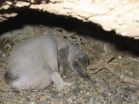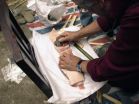(Press-News.org) Researchers from the Wildlife Conservation Society, the University of Washington, and other groups are grappling with a wildlife mystery: Why are some penguin chicks losing their feathers?
The appearance of "naked" penguins—afflicted with what is known as feather-loss disorder—in penguin colonies on both sides of the South Atlantic in recent years has scientists puzzled as to what could be causing the condition.
A study on the disorder appears in a recent edition of the journal Waterbirds. The authors of the paper are: Olivia J. Kane, Jeffrey R. Smith, and P. Dee Boersma of the Wildlife Conservation Society and the University of Washington; Nola J. Parsons and Vanessa Strauss of the South African Foundation for the Conservation of Coastal Birds; and Pablo Garcia-Borboroglu and Cecilia Villanueva of Centro Nacional Patagónico.
"Feather-loss disorders are uncommon in most bird species, and we need to conduct further study to determine the cause of the disorder and if this is in fact spreading to other penguin species," said Boersma, who has conducted studies on Magellanic penguins for more than three decades.
The feather-loss disorder first emerged in Cape Town, South Africa in 2006, when researchers for the South African Foundation for the Conservation of Coastal Birds (SANCCOB) first observed the disorder in African (or black-footed) penguins in a rehabilitation center. During that year, approximately 59 percent of the penguin chicks at the facility lost their feathers, followed by 97 percent of the chicks at the facility in 2007, and 20 percent of the chicks in 2008. Chicks with feather-loss disorder, it was discovered, took longer to grow to a size deemed suitable for release into the wild. The chicks eventually began growing new feathers.
One the other side of the South Atlantic, researchers from WCS and the University of Washington observed feather-loss disorder in the chicks of wild Magellanic penguins (closely related to African penguins) for the first time in 2007 in four different study sites along Argentina's coastline. Researchers also noted that while feathered chicks sought out shade in the hot midday sun, featherless chicks remained in the sun's glare. Several of the chicks with feather-loss disorder died during the study.
In both instances, penguin chicks with feather-loss disorder grew more slowly than feathered chicks. Featherless chicks were also smaller in size and weight than feathered chicks; both disparities were due to the increased energy spent in thermoregulation in the absence of an insulating coat of feathers and/or down. So far, the possible causes include pathogens, thyroid disorders, nutrient imbalances, or genetics.
"The recent emergence of feather-loss disorder in wild bird populations suggests that the disorder is something new," said Mariana Varese, Acting Director of WCS's Latin America and Caribbean Program. "More study of this malady can help identify the root cause, which in turn will help illuminate possible solutions."
"We need to learn how to stop the spread of feather-loss disorder, as penguins already have problems with oil pollution and climate variation," said Boersma. "It's important to keep disease from being added to the list of threats they face."
INFORMATION:
'Naked' penguins baffle experts
Wildlife Conservation Society and others discover chicks with feather-loss disorder in Argentina and South Africa
2011-04-09
ELSE PRESS RELEASES FROM THIS DATE:
Bacterial genome may hold answers to mercury mystery
2011-04-09
OAK RIDGE, Tenn, April 8, 2011 -- A newly sequenced bacterial genome from a team led by the Department of Energy's Oak Ridge National Laboratory could contain clues as to how microorganisms produce a highly toxic form of mercury.
Methylmercury, a potent human neurotoxin, appears in the environment when certain naturally occurring bacteria transform inorganic mercury into its more toxic cousin. Few bacterial species are capable of this conversion, and exactly how the transformation takes place has been a matter of debate for decades.
"What is not known are the genes ...
Free software makes computer mouse easier for people with disabilities
2011-04-09
The hand moves the computer mouse, but the cursor doesn't comply. The cursor doesn't go where told.
The hand tries again. The cursor shoots past the intended target.
The hand tries a third time – and the cursor loops farther from the target than where it started. And the user is frustrated.
So it often goes for computer users whose motor disabilities prevent them from easily using a mouse.
As the population ages, more people are having trouble with motor control, but a University of Washington team has invented two mouse cursors that make clicking targets a whole ...
US House budget plans would jeopardize scientific research facilities
2011-04-09
WASHINGTON, D.C. – It is important that the United States begin to live within its means and address the federal deficit. But APS believes that as a nation we need to be smart about how we do it. Cutting spending across the board without a clear understanding of what it means for America's future jeopardizes the very future we want to secure for our children.
For more than half a century, science and technology have been the primary drivers of job creation and economic growth. Slashing spending on science, as the budget plans of the House of Representatives call for, ...
Are invasive plants a threat to native biodiversity? It depends on the spatial scale
2011-04-09
The phrase "invasive plant species" typically evokes negative images such as broad swaths of kudzu smothered trees along the highway or purple loosestrife taking over wetlands and clogging waterways—and as such, invasive plants are largely viewed as major threats to native biodiversity. However, research has shown both that invasive species may be one of the most important threats to biodiversity and that plant invasions are rarely the cause for native species extinctions. How can these conflicting pieces of evidence be reconciled?
Kristin Powell, from Washington University, ...
Reformed Medicaid program must put coordinated care at forefront of efforts
2011-04-09
SAN DIEGO, April 8, 2011 -- A reformed Medicaid program must put coordinated primary care at the forefront of its efforts, the American College of Physicians (ACP) said in a new position paper released today at Internal Medicine 2011, ACP's annual scientific meeting. Medicaid and Health Care Reform highlights how primary care physicians will assume a major role in providing care to Medicaid beneficiaries.
"The Medicaid program faces significant changes in the next few years as millions of current and newly eligible people will receive Medicaid coverage," said J. Fred ...
Americans' views of college access varied, often inflated
2011-04-09
A study by Indiana University sociologists found that many Americans had inflated views of minority students' opportunities to attend college, yet a large contingent - around 43 percent of people surveyed - believed that low income students had fewer opportunities for college access.
The study, which will be discussed on Monday at the American Educational Research Association's meeting in New Orleans, found that Americans have varying beliefs when it comes to college access. A quarter of the people interviewed thought minority and low-income students held a better position ...
NIH researchers identify cause and new treatment for common recurrent fever in children
2011-04-09
A preliminary study conducted by a team at the National Institutes of Health has identified a promising new treatment in children for the most common form of a rare disorder. The syndrome is called periodic fever associated with aphthous stomatitis, pharyngitis and cervical adenitis — or PFAPA — and is characterized by monthly flare-ups of fever, accompanied by sore throat, swollen glands and mouth lesions.
The proposed treatment, which will be validated in a larger study before it is recommended in treating PFAPA syndrome, wards off an inappropriate immune system attack ...
Prompt Proofing Blog Post: How to Improve Your Writing - Part 1
2011-04-09
VANCOUVER, BC, April 09, 2011 /24-7PressRelease/ -- This is the first of a six-part series on improving your writing style. Whether you write for business or academic purposes, there are a few golden rules that will help you sharpen up your prose.
Part 1: Avoid wordiness and repetition
Many of us fall into this trap, for various reasons. Possibly this is just a bad habit we have got into or perhaps we feel that we need to have extra words, either to reinforce our point, or (Heaven forbid) to 'pad out' our academic writing to make up a stipulated word count. If you ...
Scientists make bamboo tools to test theory explaining East Asia's Stone Age tool scarcity
2011-04-08
The long-held theory that early human ancestors in East Asia crafted their tools from bamboo and wood is much more complicated than originally conceived, according to a new study.
Research until now has failed to address a fundamental question: Is it even possible to make complex bamboo tools with simple stone tools?
Now an experimental archaeological study — in which a modern-day flint knapper replicated the crafting of bamboo knives — confirms that it is indeed possible to make a variety of bamboo tools with the simplest stone tools.
However, rather than confirming ...
Ancient fossils hold clues for predicting future climate change, scientists report
2011-04-08
By studying fossilized mollusks from some 3.5 million years ago, UCLA geoscientists and colleagues have been able to construct an ancient climate record that holds clues about the long-term effects of Earth's current levels of atmospheric carbon dioxide, a key contributor to global climate change.
Two novel geochemical techniques used to determine the temperature at which the mollusk shells were formed suggest that summertime Arctic temperatures during the early Pliocene epoch (3.5 million to 4 million years ago) may have been a staggering 18 to 28 degrees Fahrenheit ...
LAST 30 PRESS RELEASES:
Ten-point plan to deliver climate education unveiled by experts
Team led by UC San Diego researchers selected for prestigious global cancer prize
Study: Reported crop yield gains from breeding may be overstated
Stem cells from human baby teeth show promise for treating cerebral palsy
Chimps’ love for crystals could help us understand our own ancestors’ fascination with these stones
Vaginal estrogen therapy not linked to cancer recurrence in survivors of endometrial cancer
How estrogen helps protect women from high blood pressure
Breaking the efficiency barrier: Researchers propose multi-stage solar system to harness the full spectrum
A new name, a new beginning: Building a green energy future together
From algorithms to atoms: How artificial intelligence is accelerating the discovery of next-generation energy materials
Loneliness linked to fear of embarrassment: teen research
New MOH–NUS Fellowship launched to strengthen everyday ethics in Singapore’s healthcare sector
Sungkyunkwan University researchers develop next-generation transparent electrode without rare metal indium
What's going on inside quantum computers?: New method simplifies process tomography
This ancient plant-eater had a twisted jaw and sideways-facing teeth
Jackdaw chicks listen to adults to learn about predators
Toxic algal bloom has taken a heavy toll on mental health
Beyond silicon: SKKU team presents Indium Selenide roadmap for ultra-low-power AI and quantum computing
Sugar comforts newborn babies during painful procedures
Pollen exposure linked to poorer exam results taken at the end of secondary school
7 hours 18 mins may be optimal sleep length for avoiding type 2 diabetes precursor
Around 6 deaths a year linked to clubbing in the UK
Children’s development set back years by Covid lockdowns, study reveals
Four decades of data give unique insight into the Sun’s inner life
Urban trees can absorb more CO₂ than cars emit during summer
Fund for Science and Technology awards $15 million to Scripps Oceanography
New NIH grant advances Lupus protein research
New farm-scale biochar system could cut agricultural emissions by 75 percent while removing carbon from the atmosphere
From herbal waste to high performance clean water material: Turning traditional medicine residues into powerful biochar
New sulfur-iron biochar shows powerful ability to lock up arsenic and cadmium in contaminated soils
[Press-News.org] 'Naked' penguins baffle expertsWildlife Conservation Society and others discover chicks with feather-loss disorder in Argentina and South Africa



